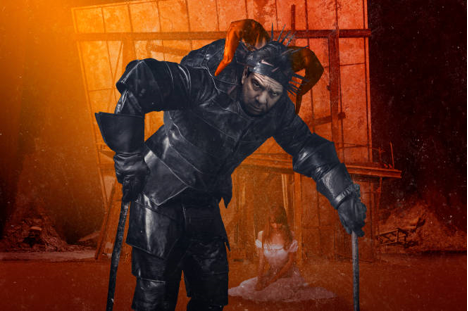Salome at the Royal Opera House
Image taken from the Royal Opera House website
If this is how the Royal Opera House is starting 2018, then we are in for a vintage year.
Oscar Wilde’s original French play Salome, translated into German all in one Act, is just under 2 hours of intense brutality and unyielding musical brilliance, built on a theme of eroticism and murder. It was first performed in Dresden in 1905 and Gustav Mahler himself wanted to conduct the opera in Vienna, but in fact the censors refused consent and did not relent until 1918. It was initially banned in London until performed at Covent Garden under the baton of Thomas Beecham in 1910.
The production by David McVicar takes place in a basement abattoir and admirably depicts the rotten core of King Herod’s dynasty in a two tier production – an elegant dinner is served upstairs, whereas in the basement, naked servant girls are abused and tormented as Jokanaan (John the Baptist) prophesises hell from his prison cell.
The young Hungarian Conductor, Henrik Nanasi, produces an intellectual deconstructed interpretation of the score, brilliantly sophisticated and thrillingly majestic. We are left with a plush and overwhelming musical sound so that not only the performers, but also the audience are exhausted by the end.
The veritable force of nature in the cast is the Salome of the Swedish lyric soprano, Malin Bystrom, who gave us an immense, somewhat frightening performance, acted to the full with a voice to match. Hers might not be a huge voice, but it is distinctive of colour and strength and where necessary she has a supreme ability to float notes as required. The intensity of her orgasm as she tries to ‘kiss the mouth’ of the Jokanaan of the outstanding Michael Volle, was frightening.
It is possible, however, that one might be slightly let down by Salome’s Dance of the Seven Veils. This daunting and complex piece of music demands a combination of vocal and dancing excellence, both sometimes performed by the soprano, but very often performed by two people – the soprano and a ballerina. Strauss provides an oriental orchestration for this part, where Salome is meant to slowly remove her Seven Veils until she lies naked at the feet of Herod. Indeed some sopranos, notably Malfitano, Mattila and Ewing, have danced and sung and appeared nude at the conclusion of the dance in a very erotic interpretation of this piece. However, here, the Director, David McVicar, transforms the dance into a psychological journey into Salome’s past, illustrating the damage to her from early childhood and helping us to understand her troubled personality. It is very much the Director’s interpretation, rather than anything written by the Composer.
All the main singers contributed to an outstanding evening, from the huge frightening voice of Michael Volle as Jokanaan, to the Herod of John Daszak and the Herodias of Michaela Schuster. The ringing voice of the British tenor, David Butt Philip as Narraboth, bodes well for the future.
In the end, we are all rather glad when, after Salome revoltingly kisses Jokanaan’s severed head, Herod orders her death - ‘kill that woman’. The audience can take no more.
David Buchler






